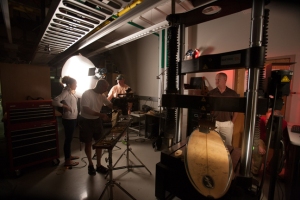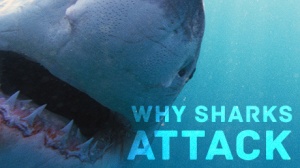Why Sharks Attack, an episode of NOVA that premieres next month on public television, will include video footage shot last summer at WKU.

For a NOVA production of “Why Sharks Attack,” Rachael Kelly, Adam Geiger and John Hawkes visited the WKU labs of biology faculty member Dr. Steve Huskey and engineering faculty member Dr. Chris Byrne last July and filmed them testing the bite force of shark teeth on a surfboard, among other things. (WKU photo by Clinton Lewis)
A production crew that included Adam Geiger, Rachael Kelly and John Hawkes visited the WKU labs of biology faculty member Dr. Steve Huskey and engineering faculty member Dr. Chris Byrne last July and filmed them testing the bite force of shark teeth on a surfboard, among other things.
“Dr. Byrne’s materials testing equipment was perfect for punching shark’s teeth into meat, bones and surfboards,” Dr. Huskey said of the tests that included great white, bull and tiger shark teeth. “He and I found some interesting results about the bite force and tooth pressure needed to inflict severe damage.”
“I think one of the most surprising results from the testing was the relative ease with which a shark tooth can penetrate a material,” Dr. Byrne said. “A surfboard is covered with a layer of high strength composite material that acts like a protective shell. The teeth penetrated with only a few pounds of biting force, and this is due to the extreme efficiency of the tooth design. They are so sharp that bite pressures at the tooth tip break fibers with strengths above 100,000 pounds per square inch, enough to glide through the protective shell and readily cut out big bites.”
Why Sharks Attack, which debuts May 7, looks at deadly shark attacks in Australia and a growing number of great white sharks appearing near Cape Cod, Mass., not far from where Steven Spielberg filmed Jaws. To separate fact from fiction, NOVA teamed up with leading shark experts in Australia and the United States, as well as bite expert, Dr. Huskey, to discover the science behind the great white’s hunting instincts and killing prowess.
“The great white is the most charismatic ocean predator we’ve got,” Geiger said.
Sharks have evolved into one of nature’s top predators and part of their behavior is to assess what they’re going to attack. “We’re really interested in the science,” Geiger said. “We’re looking at very interesting aspects of shark behavior. The lab here at WKU was perfect to measure the force needed to penetrate the surfboard.”
Sharks can “read” their teeth to determine if what they’ve bitten into is really something they want to eat, such as a surfboard or a sea lion, Dr. Huskey said. “Sharks have had over 400 million years of evolution to fine-tune their ability to detect what’s edible and what’s not,” he said. “If they decide to commit to a kill, it’s all but over. But they also have an uncanny ability to reject prey that they find unpalatable. Lucky for us, most sharks think we taste bad.”
Dr. Byrne said it was interesting to see how teeth from different sharks gave different results. “As example, the serrated tooth was seen to saw through the tough fibrous shell of the surfboard, while non-serrated teeth slipped through without that micro-sawing action. Each tooth seemed efficient in a different way,” he said.
Last summer’s visit to WKU was part of a five-week shooting schedule that included stops in Australia and Cape Cod. So how did the crew end up in Bowling Green?
Geiger, a director/producer for SeaLight Pictures, filmed Dr. Huskey in 2010 while working on a National Geographic Channel production of Sea Strikers that featured Dr. Huskey’s research on the feeding behaviors of high-velocity, ocean fish. Geiger knew about Dr. Huskey’s expertise on fish jaws and bite mechanics and invited him to be a part of the Why Sharks Attack production.

“Why Sharks Attack” will air on KET at 8 p.m. CT May 7 and on WKU PBS at 8 p.m. and 11 p.m. CT on June 10.
The show is aimed at debunking a number of the myths about shark attacks in hopes of creating a sense of revere for sharks. Dr. Huskey hopes the public will do their part in protecting the ocean’s top predator.
Why Sharks Attack will air on KET at 8 p.m. CT May 7 and on WKU PBS at 8 p.m. and 11 p.m. CT on June 10.
More: View from the Hill segment on production team’s visit in July 2013.
Contact: Steve Huskey, (270) 745-2062.






Leave a comment